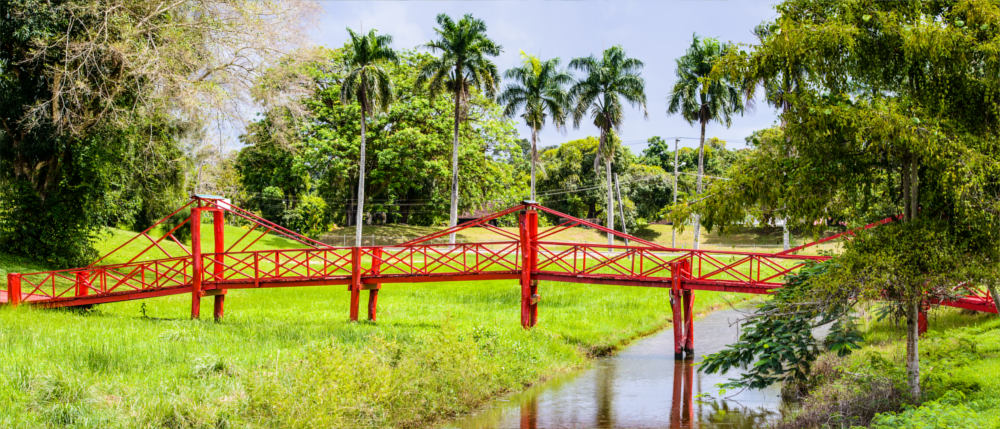Travel Offers
Travelmyne Featureprint
Distance
Suriname - The Tiny One among the South American States
The South American country of Suriname is excellently suited for nature-loving adventurers. Great parts of the jungle have hardly been explored yet and wild animals can roam free here. With a bit of luck, travellers can watch jaguars, turtles, parrots and sloths.

Geography - The continent's smallest state
Suriname lies in the north of South America and is the smallest of all the (independent) states on the subcontinent. It borders on Guyana, French Guiana, Brazil and has a coast at the Atlantic Ocean. The climate is tropical with very high humidity and an average yearly temperature of 27 °C. Occasionally, raging tropical storms afflict the country.

Nature - The tropical realm
Over 80 percent of the country's area are covered in thick, tropical rainforest. This forest is part of a much greater thing - the Amazon rainforest. Suriname's diverse flora and fauna are a dream come true for every student of nature and biologist. There is a lot to discover for nature enthusiasts. Jaguars and monkeys roam the jungle, sloths relax in the treetops and parrots add spots of colour to the green landscape. In the middle of the forests, you see impressive waterfalls, table mountains and the great Brokopondo Reservoir.

Natural sights - Suriname's national parks
There are about a dozen wonderful national parks in Suriname. Many operators have dedicated themselves to sustainable tourism. Eco-trips through the jungle are as popular as visits to Galibi's beaches. Marine turtles lay their eggs there between March and July. Well hidden, without disturbing the animals, lovers of nature can watch this unique spectacle. Other worthwhile destinations are the gigantic Brokopondo Reservoir (1,560 km²), the jungle resort of Awarradam on an island in the forest and the present-day natural oasis of Phedra, which once developed from the mining of bauxite.

Culture - A Dutch colony
The region of present-day Suriname was already populated by Arawak people and Caribs several centuries ago. The first European discoverer was Columbus in 1498. Suriname was declared a Dutch colony and was developed extensively. Although the country has been independent since 1975, Dutch is still its official language. Most of Suriname's inhabitants, however, use the Creole language of Sranan Tongo. In some regions, people also understand and speak English.

Cultural sights - Of Native Americans and sugar plantations
You still see many buildings and relics from colonial times in the capital of Paramaribo. Important sights in this city are the Independence Square in the old town centre with the Presidential Palace, Fort Zeelandia, the market square and the great Saint Peter and Paul Cathedral. Not far from Paramaribo you find the Native American village of Pikin Poika. Visitors can dive into the world of the native inhabitants here and watch traditional tribal dances. Another relic of bygone days are the old sugar plantations in Marienburg. The open-air museum of New Amsterdam provides insights into Suriname's cultural life.

Experience - Paramaribo's nightlife
Travellers have various opportunities to have dinner in Paramaribo in the evening. The Indonesian cuisine is very common here. Nasi Goreng and Bami Goreng have gained worldwide renown. Holidaymakers can taste the Creole peanut soup, the Indian chicken curry or the Chinese chop suey. After your meal, you can spend the evening relaxing in a bar, dancing in a night club or gambling in a casino.

Activities - Out and about in a dugout
You find bathing and water sports opportunities in the village of Domburg or in the holiday resort of Colakreek. A special experience is a trip along the Paloemenu River in a dugout. But beware! There are many rapids, which is why such a trip is not a good idea for people with a week stomach. You find beautiful hiking routes in the village of Zeedijk. One of them runs along the scenic Courantyne (Corantijn) River. The hilly country also offers climbing opportunities. A popular destination for summiteers is the granite mountain of Kasikasima.

Information
The best time for travelling Suriname are the dry periods from February to April and August to December. Like in the neighbouring country of Guyana, there is left-hand traffic in Suriname. Holidaymakers should consider carefully whether they want to drive themselves. The road conditions are rather bad and there is hardly any signposting.
Suriname is a natural experience for adventurers and requires good planning. Once you have cleared this hurdle, you are rewarded with the country's beauty.


















